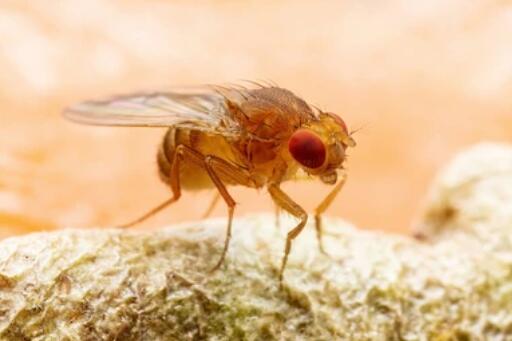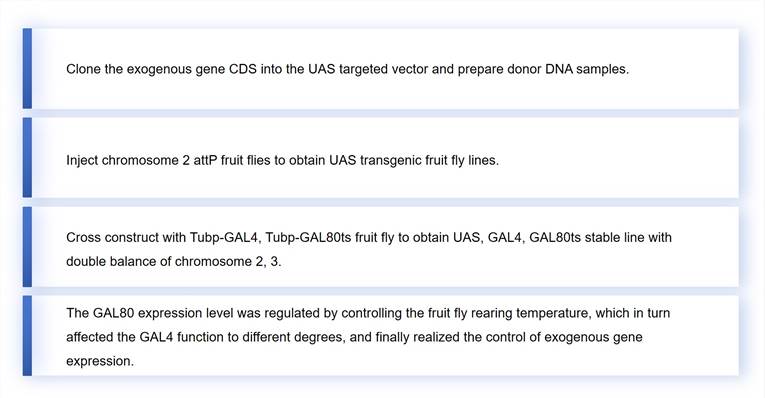Gene editing technology is essential for studying the structure, function, and regulation of fruit fly (Drosophila melanogaster) genes. Gene editing can knock out or rescue genes, up-regulate or down-regulate expression, track the period and site of gene expression, conditionally express target genes, manipulate specific cell populations, and so on. Lifeasible has comprehensive, mature, and efficient gene editing technology services, which can perform transposase-mediated random insertion transgenesis, integrase PhiC31-mediated targeted insertion transgenesis, and CRISPR/Cas9 gene editing for fruit flies. It covers the whole process from program design to obtaining stable lines.

Transposase randomized insertion
We mainly use two techniques, P-element and piggybac, by injecting plasmid DNA with exogenous target fragments, transposon sequences, and positive screening markers into embryos and co-injecting transposase helper plasmids. After obtaining a positive, the chromosomal information of the insertion site can be obtained by mapping, and the corresponding stable line can be constructed. Since the fixed insertion and gene editing technologies are more mature and have obvious advantages, we suggest our customers choose the non-random insertion technology to make transgenic fruit fly lines, except for special needs.
Integrase targeted insertion
Commonly used regulatory sequences: 5-20×UASt, LexAop, QUAS, UASp, SV40, P10, K10 and so on.
Commonly used genes are GAL4, GAL80, LexA, p65AD, GAL4DBD, QF, QS, GS, FLP, etc.
Introduction of exogenous genes for in vivo expression in fruit flies
The transfer of exogenous genes into the fruit fly genome and their expression in vivo is generally realized through the GAL4-UAS binary regulatory system. However, when GAL4 is driven by a strong promoter expressed throughout the body, the exogenous gene will be overexpressed in all cells of the fruit fly, which in turn produces toxicity, leading to decreased viability or even death of the fruit fly and causing inconvenience to the study of gene function.
To solve the above problems, we introduced the chromosome 3 Tubp-GAL4 and Tubp-GAL80ts fruit fly lines to realize the control of exogenous gene expression by feeding temperature.

CRISPR-based gene editing in Drosophila melanogaster
Customers only need to provide the species, gene name or sequence, and cloning method, and specify the needs; we can develop the most suitable full-process program. We provide an electronic version of the protocol (including cloning primers, vector sequences, gRNA design, etc.) for customers to confirm and ensure we can accurately achieve the customer's research objectives.
Depending on the project requirements, we will provide endogenous expression vectors for PiggyBac, P-element, PhiC31, Cas9, and other enzymes for microinjection. We have many types of plasmid vectors for vector construction, endotoxin removal, plasmid extraction, plasmid purification, and other DNA sample preparation services. For CRISPR, we first perform target sequence sequencing to confirm the target sequence and then synthesize gRNA and cas9mRNA in vitro using our method to obtain highly efficient RNA samples.
We have an experienced injection team with years of experience in the field, equipped with the industry's top microinjector to ensure that the efficiency of gene editing is continuously stabilized at a high level. We have a wide range of injectable fruit flies to choose from, including wild-type with different backgrounds, endogenously expressed cas9 fruit flies with different chromosomes, and attP fruit fly lines.
We facilitate the acquisition of positives by simultaneous transfer of screening marker genes. We perform molecular characterization of the screened positive fruit flies to ensure the accuracy of the genome sequence. A comprehensive hybridization and molecular characterization process is used to obtain positives without screening markers.
We can construct and deliver inbred lines according to customers' requirements, including marker removal lines, pure lines, multiple equilibrator lines, multi-chromosome stable lines, etc.
Lifeasible offers deeper discounts for the full process of customization and has taken certain initiatives and set up appropriate terms to ensure the project cycle and success rate so that customers can obtain Drosophila melanogaster lines that perfectly fit the research purpose with less effort, shorter time, and lower cost. Feel free to call or email us for more information.